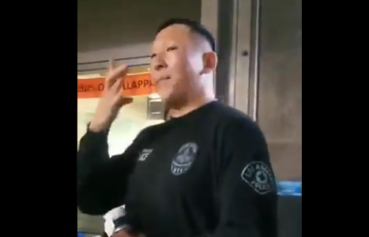Christopher Dorner got his wish.
Ex-police officer Dorner, the subject of a massive manhunt in California and suspect in the killing of three people, wrote a rambling 6,000-word manifesto describing the racism and corruption of the Los Angeles Police Department in graphic detail. Now it appears that many people believe him.
Donner threatened to kill for his wrongful termination from the LAPD. He said he wrote the manifesto to clear his name. Now, there are Facebook pages popping up in support of him and messages all over the Internet from people who say his claims deserve to be investigated.
While a story in The New York Times makes it a racial issue, saying that many African-Americans support Dorner, there doesn’t appear to be a racial motive for his support based on Facebook messages and posts across the Internet.
On the Facebook page entitled “I Support Christopher Dorner,” which had more than 3,500 “likes” as of Saturday morning, this is the explanation given for the page’s creation: “This is not a page about supporting the killing of innocent people. It’s supporting fighting back against corrupt cops and bringing to light what they do.”
In an interview with the Los Angeles Daily News, the unidentified creator of the page said, “I don’t condone the acts of killing people, but I was going to try to spin it in a way that people can actually learn from him. It’s a perfect story about a person who wanted to just do the right thing, but couldn’t catch a break. Maybe if enough people talk about it, hear it, see it, maybe some change can come out of it.”
Of course, while Dorner points to an endemic corruption and racism in the LAPD, it doesn’t appear that officials there have any interest investigating the claims of an accused murderer.
“These are the rantings of a clearly very sick individual,” William J. Bratton, former LAPD police chief, told The New York Times yesterday. “It would be a shame if he was able to rally to his cause people who remember the bad old days of the LAPD.”
The current police chief, Charlie Beck, told the Times he did not give any credence to Dorner’s claims of racism in the department.
“You’re talking about a homicide suspect who has committed atrocious crimes,” he said. “If you want to give any attribution to his ramblings on the Internet, go right ahead. But I do not.”
“He wants to reclaim his name, but you don’t do that by shooting innocent family members,” said Stephen G. Tibbetts, a criminology professor at Cal State San Bernardino, who specializes in profiling and criminal theory. Tibbetts told the LA Daily News, “Even people who seem like heroes who fight against “authority,” they don’t go after the daughter of the person they hate in the authority. There’s obviously a screw loose there, and anybody that would support anything he believes — after something like that — is crazy. Actually, it’s even crazier.”
Police suspect Dorner’s first two targets were Monica Quan, 28, the daughter of one of his former LAPD colleagues, Randy Quan — who was the first Asian-American captain in LAPD history — and her fiance, Keith Lawrence, 27.
Quan was an assistant women’s basketball coach at Cal-State Fullerton and Lawrence was a public safety officer at University of Southern California. The two met when they were student athletes at Concordia University. They were found slumped over in a parking garage near their condominium in Irvine. They had been killed in their car on Sunday evening after leaving a Super Bowl party.
On Thursday in Corona, Dorner is accused of shooting an LAPD cop who had been assigned to protect one of the officers he threatened in the manifesto, according to LAPD Officer Tenesha Dobine.
Dorner is also suspected of ambushing two Riverside officers at an intersection, killing one and sending the other to the hospital.
“I know I will be villified (sic) by the LAPD and the media,” Dorner wrote in his manifesto. “Unfortunately, this is a necessary evil that I do not enjoy but must partake and complete for substantial change to occur within the LAPD and reclaim my name.”
Some supporters on the Internet called Dorner, “Rambo” or “the black Jason Bourne,” after popular movie characters, although the case feels like a real-life enactment of the Jamie Foxx-Gerard Butler movie “Law Abiding Citizen.”
In his manifesto, Dorner says the killing won’t stop until the LAPD holds a press conference and tells the public the truth about his wrongful termination so that he can clear his name.
“The question is, what would you do to clear your name?” Dorner wrote in his manifesto, which was published in its entirety on a site called LAist.com after it had been removed from Facebook. “A name is more than just a noun, verb, or adjective. It’s your life, your legacy, your journey, sacrifices and everything you’ve worked hard for every day of your life as adolescent, young adult and adult. Don’t let anybody tarnish it when you know you’ve live up to your own set of ethics and personal ethos.”
In his manifesto, most of Dorner’s preoccupation was with the case that led to his termination on Jan. 2, 2009.
Dorner said he also lost his position as commanding officer of a Naval Security Forces reserve unit because of the LAPD. Dorner reported in August 2007 that he saw another officer use excessive force when he was a patrol officer in the LAPD’s Harbor Division.
He said the officer kicked a homeless man suffering from schizophrenia and dementia twice in the chest and once in the face, leaving bruising on the cheek that was corroborated by the man’s father. But instead of the officer, a woman, receiving punishment, Dorner said he was later terminated in retaliation. He recounts other acts of brutality committed by this female cop, including ripping the flesh on the arm of an elderly woman.
“The department has not changed since the Rampart and Rodney King days,” Dorner wrote, citing the LAPD’s most high-profile case of corruption (Rampart) and police brutality (the Rodney King beating). “It has gotten worse. The consent decree should never have been lifted. The only thing that has evolved from the consent decree is those officers involved in the Rampart scandal and Rodney King incidents have since promoted to supervisor, commanders, and command staff, and executive positions.”
Dorner goes on to lash white, black, Latino, Asian and lesbian officers for each contributing to the culture of abuse and corruption in the department. He cited white officers who join the department with the sole intent of victimizing minorities; black officers in supervisory positions who abuse and belittle their white subordinates and “breed a new generation of bigoted Caucasian officer;” Hispanic officers who demean and disrespect other Hispanics to gain the acceptance of white officers; lesbians in positions of authority, who go out of their way to demean male officers; and Asian officers who watch it all without raising a word of protest because they just want to avoid conflict.
Dorner even encourages civilians not to help police officers in need because “they would not do the same for you.”


